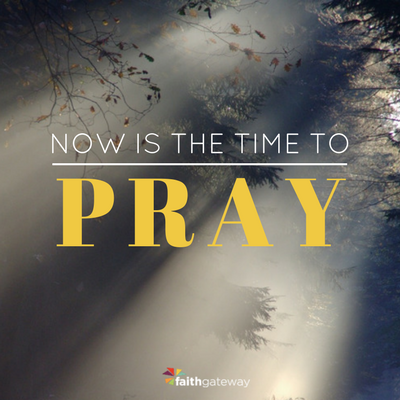
I was shocked too when I saw this as the subject of one of the devotions I get every morning in my email. This one from Prayer.full from FaithGateway is an excerpt from the book Moving Mountains by John Eldredge. I wondered how a Christian author could actually write about not not saying "I'll pray for you. That is until I read why he stopped saying it.
Now that I understand his reason I may stop saying it too. (To get the book click on its image after the post).
Why I Stopped Saying ‘I Will Pray For You’
by John Eldredge fromMoving Mountains
I’ve come to the place where I have had to stop telling people, “I’ll pray for you.”
I simply know that despite my good intentions — and these promises are almost always spoken with good intent — I know that nine times out of ten I just don’t remember to follow through. Not until maybe a week or two later, and then I feel guilty that I forgot. I don’t like promising something I probably won’t live up to.
You know how these stories go: Someone you care about tells you of their pain, need, or struggle, and you respond with, “Oh, I’m so sorry to hear that; I’ll pray for you.” But then, most of the time, we never do.
If all the prayers that were promised were actually prayed, this would be a different world by now.
So instead of promising future prayer, what I try to do nowadays is stop, right there in the moment, and pray. Right then and there. It’s funny how many Christians this actually throws off guard. “You mean, right now?” “Yes — absolutely. Let’s pray.”
In the restaurant, in the car, on the plane, wherever. If it’s a text or e-mail request, I’ll start praying as I type my response, typing out a prayer for them right then and there. Not only does it help me follow through, but it helps them to agree right along with what I have prayed, and agreement is mighty powerful, as we know.
I’m thinking of St. Patrick, how he would pray through the course of the day as he worked: “Tending flocks was my daily work, and I would pray constantly through the daylight hours. The love of God and the fear of Him surrounded me more and more — and faith grew and the spirit was roused, so that in one day I would say as many as a hundred prayers and after dark nearly as many again.”1
He simply did it right there, in the moment. For the truth is, there is no “later.”
Now is the time to pray, for now is all we really have.
“Jesus, come into this — we invite You into this” is a great place to start. Whatever the need — guidance, direction, encouragement, healing, protection; the cancelled flight, the report from the doctor, the tension in relationship — this is the place to start. Invite Jesus right into the heart of it all, right there, in the moment. “Jesus, come into this — we invite You into this.”
We do this often in our meetings at Ransomed Heart. Someone will say, “I think we ought to pray about such-and-such,” and I’ll reply, “Go for it. Lead us. Right now,” and we’ll stop what we are doing and pray. Because if we don’t, we rarely get back around to it. I don’t know how many Christian meetings I’ve been in — board meetings, elder meetings — when all the time is used talking about what needs prayer, and we find we have barely a few minutes left at the end for one quick, little, rushed prayer.
It’s a brilliant ploy of the enemy — keep God’s people talking about it, debating, conjecturing, worrying over it, speculating, so they never really get around to praying.
By all means, pray when you have time and space to devote yourself to it, time to truly seek God. But pray now too — because you don’t know that you will get to it later.
1. Thomas Cahill, How the Irish Saved Civilization: The Untold Story of Ireland’s Heroic Role from the Fall of Rome to the Rise of Medieval Europe (New York: Anchor, Doubleday, 1996), 102.
Excerpted with permission from Moving Mountains by John Eldredge, copyright John Eldredge, 2016.
|
|
|

 RSS Feed
RSS Feed